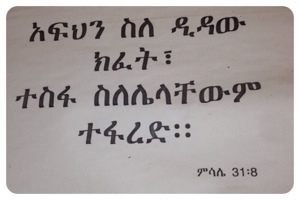 I believe that this is Amharic. It may be Ge’ez a localized dialect but I’m not sure. Amharic is a Semitic language spoken in Ethiopia. It is the second-most spoken Semitic language in the world, after Arabic, This is a sign on the wall of a school for special needs children. The school is in Mekanissa Ethiopia and they serve over 300 children. I was supposed to be visiting this school this last week. I was invited to go with the President of Synod to Kenya, Ghana, Ethiopia, Madagascar and Germany. I obviously couldn’t go but wish I could have. I have been fighting a strange head cold, sinus issue for a while now so I wouldn’t have been much of a traveler anyway. I have however been following “my trip” on the Blog site “Witness, Mercy and Life Together”. You can go there by clicking on the right hand side of this blog on “Witness, Mercy and Life Together”. This is from that blog.
I believe that this is Amharic. It may be Ge’ez a localized dialect but I’m not sure. Amharic is a Semitic language spoken in Ethiopia. It is the second-most spoken Semitic language in the world, after Arabic, This is a sign on the wall of a school for special needs children. The school is in Mekanissa Ethiopia and they serve over 300 children. I was supposed to be visiting this school this last week. I was invited to go with the President of Synod to Kenya, Ghana, Ethiopia, Madagascar and Germany. I obviously couldn’t go but wish I could have. I have been fighting a strange head cold, sinus issue for a while now so I wouldn’t have been much of a traveler anyway. I have however been following “my trip” on the Blog site “Witness, Mercy and Life Together”. You can go there by clicking on the right hand side of this blog on “Witness, Mercy and Life Together”. This is from that blog.
The sign is Psalm 31:8 – Open your mouth for the mute, for the rights of all who are destitute.
Prior to the center’s founding in 1986, mentally disabled children were hidden away in dark rooms — their very existence was denied. The German Lutheran theologian Oswald Bayer said that to be justified is to be recognized. In some cases, the recognition of people, in this case, the human care for the children brings them into contact with the church so they can hear the Gospel.
I am very interested in this school and how the Ethiopians run it. As those of you who have followed this blog for a while know Minnesota North and the North Dakota District LCMS have entered into a partnership with the LCMS, Project 24 and 1001 Orphans to build orphan rescue centers in Kenya. Project 24 is the “brick and mortar” piece. 1001 Orphans is the “support” piece and LCMS is the administrative piece that grants funds and tracks progress and we have had some difficulties. Centers get built and occupied for a time but the support for the orphans may be lacking or insufficient. The orphan support may be there but the structure was damaged and hasn’t been repaired. The structure may have been built and the support is there, but local situations in the church may be less than one could expect.
We have been working with the Kenyans and the world relief side of the Office of International Missions and plans are in place to fix the problems. People have given gifts and offerings and we want them to know that they are being spent in a responsible way. At the same time we need to continue to ‘open our mouths for the mute and for the rights of all who are destitute.”


